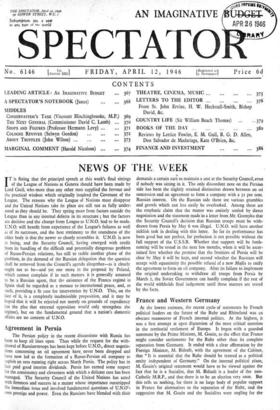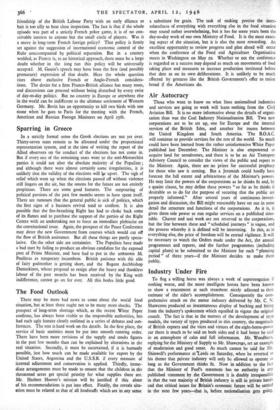France and Western Germany
At the lowest estimate, the recent cycle of statements by French political leaders on the future of the Ruhr and Rhineland was an obscure manoeuvre of French internal politics. At the highest, it was a first attempt at open discussion of the most critical question in the territorial settlement of Europe. It began with a guarded statement by the Prime Minister, M. Gouin, to the effect that France might consider settlements for the Ruhr other than its complete separation from Germany. It ended with a clear affirmation by the Foreign Minister, M. Bidault, with the agreement of the Cabinet, that " It is essential that the Ruhr should be treated as a political entity independent of Germany." On the internal political plane, M. Gouin's original statement would have to be viewed against the fact that he is a Socialist, that M. Bidault is a leader of the neo- Catholic M.R.P., and that there is to be an election very soon. But this tells us nothing, for there is no large body of popular support in France for alternatives to the separation of the Ruhr, and the suggestion that M. Gouin and the Socialists were angling for the
friendship of the British Labour Party with an early alliance as bait is too silly to bear close inspection. The fact is that if the whole episode was part of a strictly French poker game, it is of no con- ceivable interest to anyone but the small circle of players. Was it a move in long-term French foreign policy? That policy is firmly set against the suggestion of international economic control of the Ruhr unaccompanied by political separation. But in a country wedded, as France is, to an historical approach, there must be a large doubt whether in the long run this policy will be universally accepted. M. Gouin's speech may have been the first (and possibly premature) expression of that doubt. Here the whole question rises above exclusive French or Anglo-French considera- tions. The desire for a firm Franco-British alliance has many roots, and discussions can proceed without being disturbed by every twist of day-to-day politics. But no country in Europe or anywhere else in the world can be indifferent to the ultimate settlement of Western Germany. Mr. Bevin has an opportunity to kill two birds with one stone when he goes to Paris for the meeting with the French, American and Russian Foreign Ministers on April 25th.



























